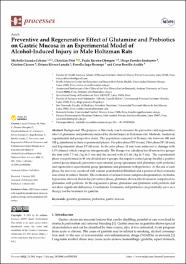Preventive and Regenerative Effect of Glutamine and Probiotics on Gastric Mucosa in an Experimental Model of Alcohol-Induced Injury in Male Holtzman Rats

View/
Download
(application/pdf: 1.501Mb)
(application/pdf: 1.501Mb)
Date
2022-03-02Author(s)
Lozada-Urbano, Michelle
Pitot, Christian
Recoba-Obregón, Paulo
Paredes-Inofuente, Diego
Cáceres, Cristina
Rivera-Lozada, Oriana
Inga-Berrospi, Fiorella
Cáceres, Cristina
Metadata
Show full item recordAbstract
Background: The purpose of this study was to measure the preventive and regenerativeeffect of glutamine and probiotics induced by alcohol injury in Holtzman rats. Methods: Analytical,experimental and prospective study. The population consisted of 56 male rats between 300 and350 g, distributed in three experimental phases: Pre-pilot phase PPP (6 rats), Pilot phase PP (10 rats),and Experimental phase EP (40 rats). In the pilot phase, 10 rats were subjected to damage with8.5% ethanol, which was given intragastrically. The dosage was calculated for 10 rats in two groups:the first with 7.5 mL/kg in 5 rats and the second with 8.5 mL/kg in 5 rats. The experimentalphase was performed in 40 rats divided into 6 groups, the negative control group (healthy), positivecontrol group (injured), preventive experimental group (glutamine and glutamine with probiotic)and regenerative experimental group (glutamine and glutamine with probiotic). At the end of eachphase, the rats were sacrificed with sodium pentobarbital (Halathal) and a portion of their stomachswas stored in formol. Results: The evaluation of stomach tissue samples (desquamation, erythema,hyperemia) showed that in the preventive phase, glutamine shows effectiveness in comparison toglutamine with probiotic. In the regenerative phase, glutamine and glutamine with probiotic didnot show significant differences. Conclusions: Glutamine and probiotics can potentially serve as atherapy for the treatment for gastritis
Collections
- Web of Science (WOS) [236]

